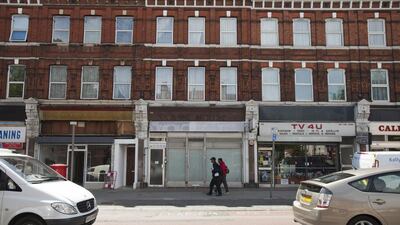LONDON // Dozens of individuals, organisations and media outlets linked to the Muslim Brotherhood in the UK are to come under increased financial scrutiny as the result of a review of the organisation's activities by the British government.
A security expert who contributed to the review told The National that although it would not recommend banning the group, this should not be seen as "an exoneration of the organisation".
Lorenzo Vidino, who was commissioned to write a paper for the review on the movement’s activities in the UK, said it had helped to crystallise a view in the government that “on the foreign policy side, the Brotherhood for the most part does not pursue interests that are aligned with those of the British government”.
One place where this was currently evident, he said, was Libya, “where the Brotherhood has shown its true colours and made clear its position on violence and who its real allies are”.
Mr Vidino, a fellow with the International Security Programme's Initiative on Religion in International Affairs at Harvard University, was revealed as a member of the review team in the Daily Telegraph on Sunday.
He confirmed to The National that he had been called in by Sir John Jenkins, the British ambassador to Saudi Arabia who led the review, and had been commissioned to write a paper on the Brotherhood's activities in the UK.
Domestically, said Mr Vidino, Britain now intended “to reduce the space” occupied by the Brotherhood.
“For a long time it has been a big mistake to treat them as legitimate representatives of the Muslim community and they are not. They have just managed to create this perception of representation through their political wisdom.”
This perception had been encouraged by as many as 60 “front” organisations, including charities and think tanks. All of these, said Mr Vidino, now faced “increased scrutiny”.
“There’s an understanding that there’s a lot of money that comes in from certain countries, like Qatar, that nobody really knows where it goes and that charities, for example, deserve a bit more scrutiny.”
The review's identification of dozens of Brotherhood-linked organisations echoes the finding of an investigation published by The National in June this year.
This identified previously unknown connections between the Muslim Brotherhood and a number of UK-based individuals, organisations and media outlets critical of the UAE, where the Muslim Brotherhood is banned.
Among them was Anas Altikriti, founder of the Cordoba Foundation, a London-based organisation whose stated aim is to promote interfaith dialogue but which was shown to have close ties to the Muslim Brotherhood.
In 2008, David Cameron, before he was British prime minister, described the foundation as “a front for the Muslim Brotherhood”.
The National found Mr Altikriti and his family had been instrumental in the setting up of the Emirates Centre for Human Rights, an organisation critical of the UAE's attempts to root out members of proscribed organisations, and whose source of funding remains unclear.
This year Mr Altikriti mounted a publicity campaign against the British government’s review.
One month after The National's investigation was published, HSBC bank closed the accounts of Mr Altikriti, his family and the Cordoba Foundation, saying they fell "outside the bank's risk appetite".
Mr Altikriti did not respond to a request for a comment on the findings of the UK government’s review.
Mr Vidino said that while it would be “extremely difficult, both politically and from a legal point of view, [to ban] such a big global entity, with branches in 80 or 90 countries”, there were “other ways of altering the government’s posture towards the Brotherhood … generally speaking to make the UK a less hospitable place”.
In addition to stricter application of immigration laws, this meant “going after the organisation through the individuals, charities and other means, making their lives more difficult”.
One of “the main takeaways from the review”, he said, was that “we have never had a good comprehensive policy on the Brotherhood, we never fully understood the movement. It was now important to pull together “all the strands of knowledge”, from government, the banking sector and academia, to conceive “a new policy which sees the Brotherhood as an adversary, something which for the most part is against British interests”.
“Without exaggerating the case and lumping the Brotherhood together with Al Qaeda or other groups, we need to make it clear that the Brotherhood is not the good guy as it has been seen in the past in many quarters of the British government.”
Dr Vidino said the British government make some of the review public next month.
“It will draw some policy conclusions, and perhaps a few pieces of the review will be released, but my understanding is that the whole report will not be released because it draws a lot on classified material.”
The review recognised that there were differences between many elements of the Brotherhood and extremist Islamist groups, said Mr Vidino.
“But it goes back to the idea, expressed by Cameron in a speech in Munich before he became prime minister, that non-violent activism is the root of the violent form.
“It doesn’t mean that there’s necessarily a direct connection, but rather than being part of the solution the Brotherhood is now being seen as part of the problem. This is what the review calls the new strategic mindset; they are part of the problem and therefore the British government needs a new strategic view to counter it.”
foreign.desk@thenational.ae

